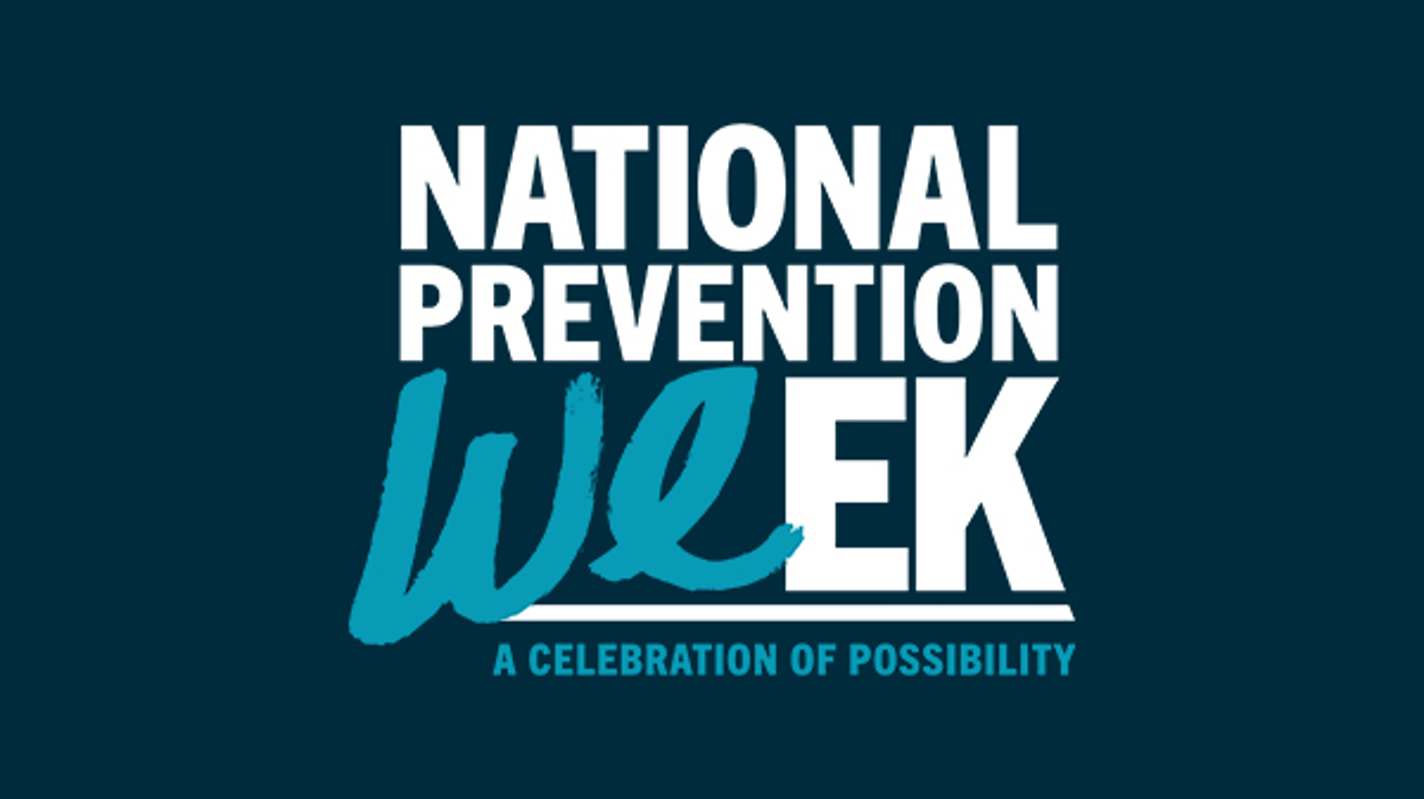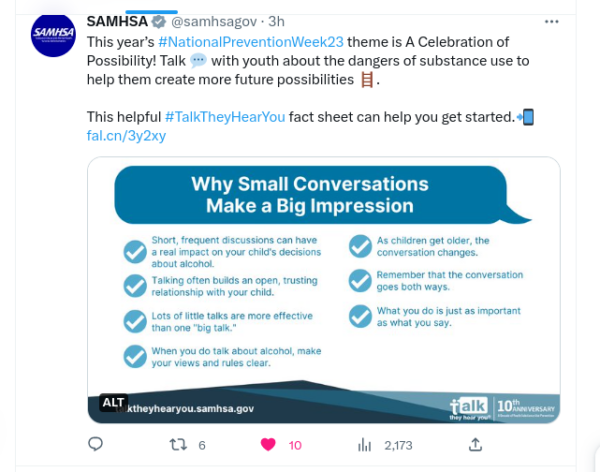
Prevention Week is Here Everybody!
It’s that time of the year again! The time for all great, good people to be recognized. It’s also the time for everyone to be reminded of those great, good efforts, and, if necessary, to avail themselves such efforts forthwith. In other words, it’s National Prevention Week and everyone’s invited!
The great, good folks at SAMHSA started the annual affair in order to herald like-minded folks across America. That is to say, folks who are engaged in substance misuse prevention and positive mental health.
Here’s how SAMHSA spells it out:
National Prevention Week is a national public education platform showcasing the work of communities and organizations across the country dedicated to raising awareness about the importance of substance misuse prevention and positive mental health.
Well aware that “the important work of prevention happens every day, SAMHSA “created National Prevention Week to celebrate these year-round initiatives and the possibilities prevention brings.”
This year’s Prevention Week tagline is “A Celebration of Possibilities.” And SAMHSA goes to great lengths to celebrate the possibilities, but also to aid and abet anyone who’s seeking to do just that.
Here’s some of what’s on offer:
Talk. They Hear You.
Now in its 10th year, SAMHSA’s “Talk. They Hear You.” Campaign “helps parents and caregivers, educators, and community members get informed, be prepared, and take action to prevent underage drinking and other substance use.” How, you ask? “By providing parents and caregivers with information and resources they need to address these issues with their children early and often.”
We’re talking about anyone under the age of twenty-one who’s at risk for some sort of substance misuse, be it alcohol or drugs. In other words, we’re talking about everyone.
That’s right, everyone under 21 is at risk. You know it. So does SAMHSA. The good folks also know that “parents and caregivers have a significant influence on their children’s decisions about using alcohol and other drugs.” And they’re going to great, good lengths to make sure those parents and caregivers speak to their kids as often and as early as possible.
Of course parents and caregivers aren’t the only people in children’s lives. Educators and community partners can impact their behavior too. That’s why SAMHSA includes them all in its round-up of resources.

Communities Talk to Prevent Alcohol and Other Drug Misuse
Communities Talk is another Prevention Week favorite, and SAMHSA provides a wide variety of tools, insights and resources so communities can better identify and meet their prevention goals.
Here’s how to be the best Preventer ever:
Planning Process
- Assessment resources to define the alcohol and other drug misuse problems among youth and young adults and a community’s needs, capacity, and readiness to respond;
- Planning resources to meet the goals and objectives identified in the assessment phase;
- Promotion resources to attract an audience of size and scope and increase community awareness; and
- Evaluation resources to determine if the Communities Talk activity was effective as a catalyst for change.
Top Planning Resources
For those who may need help organizing their next Communities Talk event, SAMHSA has also created a web app that includes success-directed resources and event management tools. The good folks also provide:
- A Quick Start Planning Guide
- Tips and Tools for Hosting a Virtual Activity
- Tips and Tools for Engaging the News Media
- Using Social Media: Sample Content and Guide
- Using Social Media: Facebook Messages
- Using Social Media: Twitter Messages
- Using Social Media: Instagram
- Customizable resources for Communities Talk to Prevent Alcohol and Other Drug Misuse activity implementation and promotion
- Event introduction videos to explain the Communities Talk initiative to your activity participants.
- Graphics: Visit the Prevention Graphics Gallery to download and share graphics about alcohol and other drug misuse prevention.
Top Resources for Alcohol and Other Drug Misuse Prevention
SAMHSA has also unleashed an arsenal of PDFs and PSAs that cover everything from “Helping Young Girls and Women Stay Healthy by Avoiding Alcohol” and “College Student Drinking” factsheet to Data Visualization Videos and “The College Drinking: Prevention Perspective” series.
National Prevention Week
As you might suspect, there’s a countrywide collection of communities taking part in National Prevention Week. In fact, a quick Google News look leads us from Kewaunee County, Wisconsin to the Texas counties of Dallas, Red Oak, Waxahachie and Navarro. We also found resounding support all across Pennsylvania, from Philly-adjacent Chester County to Lehigh Valley’s Wilson Area Communities That Care Coalition and the Commonwealth Prevention Alliance in State College. In fact, Kewaunee County Sheriff Matt Koski reminded us of the Prevention Week day-to-day in the Door County Daily News.
To wit:
- Monday: Prevention of Underage Drinking
- Tuesday: Prevention of Prescription Drug Abuse and Illicit Drug Use
- Wednesday: Prevention of Alcohol Abuse
- Thursday: Suicide Prevention
- Friday: Promotion of Mental, Emotional, and Behavior Well Being
Healing Properties would like to add that it’s terrific to see a sheriff so engaged with his community!
Crisis Help
If you or someone you know is in danger or having a medical emergency, call 911 or go to your nearest emergency room. Otherwise you can call or text 988 or chat at 988lifeline.org. There you’ll be able to speak with a trained crisis counselor any time of day or night.
SAMHSA’s Helpline provides free and confidential help. 24-hours a day, seven days a week, 365 days a year. There you can get treatment referral and information about mental health and drug or alcohol use disorders, prevention, and recovery in both English and Spanish.
- Call: 1-800-662-4357
- TTY: 1-800-487-4889
- Text your ZIP code to: 435748
- Visit SAMHSA’s National Helpline
SAMHSA also maintains a Disaster Distress Helpline for people who have experienced natural or human caused disasters, such as a tornado or crime. It provides 24/7 crisis counseling and support to people feeling emotional distress due to the disaster.
If you’re Deaf or Hard of Hearing and in crisis, you can access a videophone service staffed by Deaf LEAD crisis workers fluent in ASL.